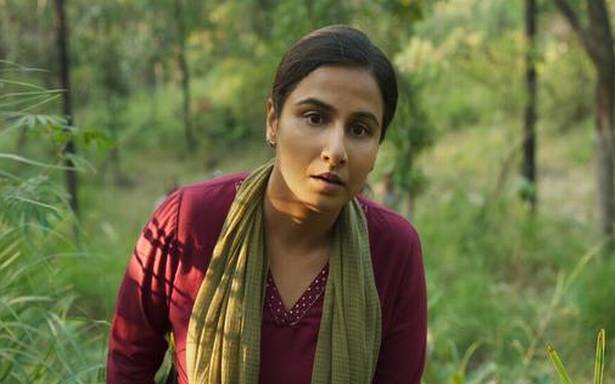Vidya Balan decodes what it meant to play a forest officer who tackles multiple challenges in Amit Masurkar’s Hindi film ‘Sherni’
Stories mirroring the man Vs. animal conflict aren’t new to Indian cinema. But what happens when a tigress is on the prowl, and a woman forest officer finds herself in the thick of things? Director Amit Masurkar’s Hindi film Sherni looks at this story through the eyes of its protagonist, portrayed by Vidya Balan. Ahead of the film’s première on Amazon Prime Video on June 18, Vidya discusses what it meant to play a female forest officer making sense of the conflict as well as battling patriarchal notions.
Also Read | Get ‘First Day First Show’, our weekly newsletter from the world of cinema, in your inbox. You can subscribe for free here
Edited excerpts from the interview:
Your film Shakuntala Devi (2020), which was intended to be a theatrical release, had a digital première. It’s a similar case with Sherni. How do you look at this pandemic-induced scenario?
After the first wave [of COVID-19] we thought we were at the end of the pandemic. But the second wave has been brutal and took us by shock. Humanity is doing its best to get through this period. One can only hope for better times and it might be here sooner than we think.
Sherni deals with the man-animal conflict in the jungle and can make for an immersive theatrical viewing experience. Did the film’s team consider waiting till the theatres reopen?
We don’t know when theatres will reopen and if people will come back in large numbers. Sherni’s story has universal appeal and it felt prudent to release it on a digital platform — in this case, Amazon Prime Video, which can take the film to 240 countries. You can experience the jungle from the comfort of your home while watching Sherni; so this is the best possible outcome under the given circumstances.
A portion of Sherni was filmed in the forest region of Madhya Pradesh before lockdown in 2020. Was it liberating to return to the jungle once the restrictions were eased?
The jungle makes for a joyous experience and all the more during the pandemic. I had friends who would ask jokingly if they could accompany me and do my hair and make-up, to be away from the city. We were in a bio bubble. As we were in the forest area, we had no interaction with outsiders and followed COVID-19 protocols. We completed filming without a single positive case on set. I love to go on long walks and enjoyed walking in the forest.
Did you watch Amit Masurkar’s Newton before you gave the nod to Sherni?
I have worked with Amit in a dozen ad films. I watched Newton only after I said yes to Sherni; it was an unusual story and I loved his method of storytelling. Watching it, I was glad I had agreed to work with him in Sherni. I found the story intriguing and fascinating.
Vidya Balan (centre) with her co-stars in ‘Sherni’ | Photo Credit: Special Arrangement
Apart from the man Vs. animal conflict, Sherni is also about a female forest officer taking on patriarchal norms. Can you discuss that?
We underestimate women who are in traditionally male-dominated bastions like the armed forces, police or the forest department, because we haven’t seen enough women in these divisions. Vidya Vincent, the character I portray, is introverted and reserved. She is not the kind who will fight back, which makes her task all the more challenging. She realises that she has to use her voice when required. Her journey mirrors that of the tigress and vice versa.
Did you meet women forest officers and what were your learnings from them?
I met two women officers who were forthcoming with their time. They gave me reading material, links to documentaries and took me on forest trails. I began looking at the forest with a fresh pair of eyes.
It can get extremely lonely when you are posted in a forest, away from your family. If you don’t enjoy being in the forest or are not passionate about your work, it can be tough. There are many battles; officers are dealing with poachers, striving to maintain an amiable rapport with villages in the forest borders and trying to integrate the tribals into the mainstream without a loss of their identity. Sometimes, there’s a tug of war between development and safeguarding the ecosystem. Forest officers do a tightrope walk.
Sherni is a metaphor for your character’s journey in the film; in a sense, can it also be a metaphor for your journey in cinema defying stereotypes?
I think it’s a metaphor for all women who navigate through social expectations and stand up against the patriarchy. Like the tigress, we all find our way.
Are you looking forward to returning to film shoots?
Everyone is waiting to get back to life as it used to be. Life has to go on, but we need to be cautious when we return to work.
Source: Read Full Article


